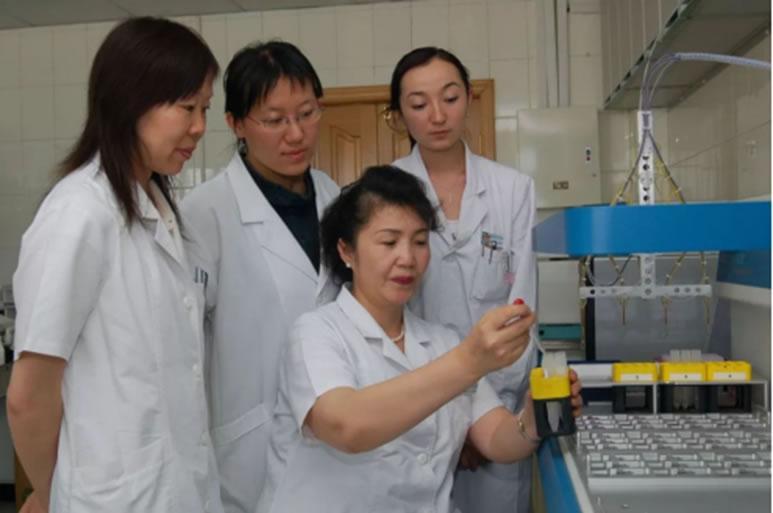Life Changing
Trying to reduce cervical cancer cases

My name is Mayinur Niyaz, and I am a gynecologist at the People's Hospital of the Xinjiang Uygur Autonomous Region in China. After graduating from Shanghai Medical University (currently known as Shanghai Medical College, Fudan University) in 1976, I joined the Department of Obstetrics and Gynaecology at the People's Hospital of Xinjiang. At that time, I observed a notable influx of late-stage cervical cancer patients being admitted to the hospital.
Later, I went to study in Japan. During my time there, I had the opportunity to observe the practice of regular gynecological examinations for the early detection and treatment of cervical cancer in Japan, which inspired me to focus my research on reducing the incidence of cervical cancer among women in Xinjiang.
Upon returning to Xinjiang, I applied to my hospital for a grant of 100,000 yuan to initiate cervical cancer screening in southern Xinjiang. After conducting a preliminary screening, I prepared a feasibility report on cervical cancer screening in Xinjiang and submitted it to the national health authorities. With their support, I was able to secure an international collaborative project.
In September 2006, our team initiated a cervical cancer screening mission in Hetian Prefecture of Xinjiang. At that time, women in remote rural areas lacked health awareness, specifically in relation to cervical cancer. They knew little about the disease and were unaware of the importance of cervical cancer screening. Some of them even feared that the screening could impact their ability to conceive. Together with my students, I visited numerous families in various villages, and repeatedly explained to the rural women what cervical cancer is and why it is important to get screened.
Follow-up examinations were conducted for those who initially tested positive. However, some women were hesitant to come for rechecks due to inconvenience. To address this issue, we visited their homes and made efforts to persuade them to undergo further examinations, in order to ensure that no patient was overlooked.
Over the years, our dedication to cervical cancer screening has enabled us to establish the Xinjiang Cervical Cancer Database. This database has played a crucial role in supporting the region's implementation of Cervical Cancer and Breast Cancer Screening Program for Women in China's Rural Areas. We are pleased to report that the number of confirmed cases identified through screening in southern Xinjiang in 2023 decreased by 60 percent compared to 2006.
What even more gratifying to me is the increasing health awareness of women in Xinjiang. Once, we had the opportunity to treat an elderly woman and her daughter-in-law who were facing a challenging situation. The elderly woman was diagnosed with late-stage cervical cancer, and had unfortunately missed the ideal time for surgery. Nonetheless, with the aid of medical insurance, she made the journey from Hetian to Urumqi for treatment. Accompanying her was her seemingly healthy daughter-in-law, who was in her thirties. The daughter-in-law attentively absorbed the health information the medical professionals provided daily to the patient, and decided to get screened herself. Regrettably, she, too, had a diagnosis of cervical cancer. Fortunately, thanks to early detection, she underwent a successful surgery and made a good recovery.
The Chinese government's increasingly improved healthcare policies have played an essential role in the mind shift of women in Xinjiang from being reluctant to see a doctor in the past to getting screening tests off their own bat now. These policies have also alleviated their economic concerns.
In recent years, the Chinese government has provided significant financial support, totaling over 57.4 billion yuan, to the healthcare system in Xinjiang. This funding has been utilized to establish a comprehensive primary healthcare service network that covers both urban and rural areas in the region, promoting the standardization of medical practices at township health centers and village clinics.
Moreover, urban and rural residents now are entitled to accessing 14 categories of essential public health services free of charge throughout their lives, such as preventive inoculation, healthcare for children under six, and healthcare for people with chronic disease. These policies have effectively guaranteed the people's right to life and health.
The author is Mayinur Niyaz, senior medical specialist and professor at the People's Hospital of the Xinjiang Uygur Autonomous Region.
Liu Xian /Editor Deng Zhiyu /Translator
Yang Xinhua /Chief Editor Ren Qiang /Coordinator
Zhang Ying /Reviewer
Zhang Weiwei /Copyeditor Tan Yujie /Image Editor
The views don't necessarily reflect those of DeepChina.
